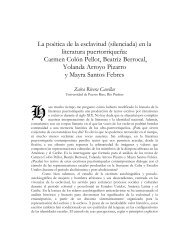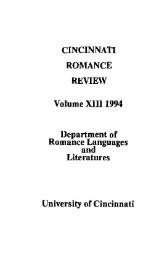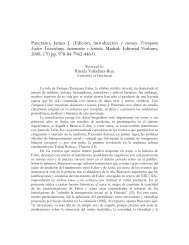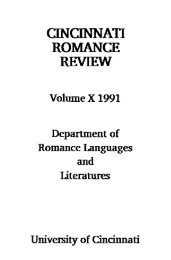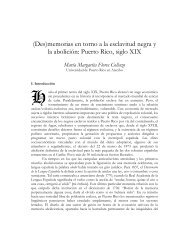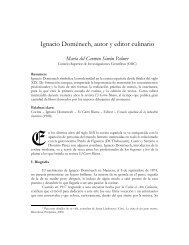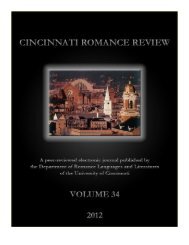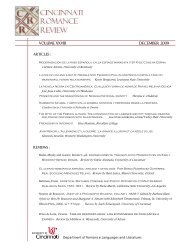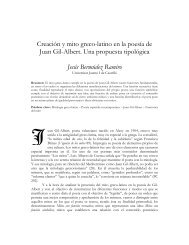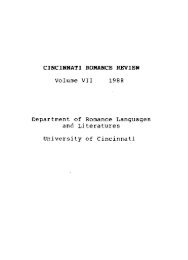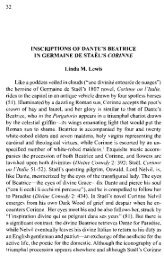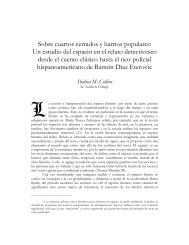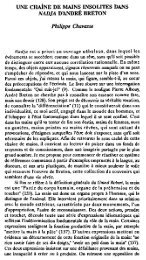Volume 30 (2011) - Cincinnati Romance Review
Volume 30 (2011) - Cincinnati Romance Review
Volume 30 (2011) - Cincinnati Romance Review
You also want an ePaper? Increase the reach of your titles
YUMPU automatically turns print PDFs into web optimized ePapers that Google loves.
“THE EROTIC AS POWER” 89<br />
students receive, such as the “corrected” version of the nation’s history when pages are<br />
missing from the history texts: “[M]e preguntaba por qué ciertas páginas de la historia<br />
de la biblioteca el colegio no tenían numeración continua. Advertí, releyendo mi texto<br />
traído de casa, que habían sido mutiladas” (22). In the backdrop of the city of Quito,<br />
army generals become figures of ultimate authority and power and the voices of dissent<br />
make their position known in graffiti, “Abajo los gorillas, Muera la Junta Militar” and<br />
youth shouting in the streets, “Abajo los ladrones, Mueran las botas asesinas” (64).<br />
When Rebeca leaves the school as a boarding student and stays at the Luz Divina<br />
mission with the black nun, Sor Inés del Rosario, danger and death become more<br />
apparent to Rebeca as her classmates remain oblivious in their own world.<br />
She also questions the negative significations associated with the color black in<br />
everyday speech (Pastoral Negra, lista negra, merienda de negros) and further questions<br />
Ecuador’s everyday racism when she and her classmates meet Sor Inés del Rosario, a<br />
black nun with revolutionary ideas such as organizing workers and black women.<br />
Although she once expressed a desire for her classmates to see her as white – by<br />
suppressing her grandmother’s African last name and providing elaborate instructions<br />
to have her parents disguise their poverty by selling some two or three head of livestock<br />
to purchase a refrigerator and supply it with food, painting the house white and filling it<br />
with borrowed Bavarian china, silverware, linens, and cattle to impress her visiting<br />
school mates – she becomes more attuned to the racial divide. She remembers<br />
incidents with her classmates at school and in their outings where they would explicitly<br />
prefer white over black. On their way to visit Rebeca’s home town in Esmeraldas, a<br />
classmate points out that they were sold tickets to travel, but the blacks who stood in<br />
line before them were told that the tickets had been sold out. Rebeca begins to visualize<br />
and “feel” the landscape and as she opens herself to this erotic moment she also sense<br />
the history of slavery and racism in Ecuador: “Al pasar por el valle del Chota manos<br />
antiguas, esclavas en cañaverales e ingenios religiosos, revivivieron en mis adentros sus<br />
tambores. Entre las nubes de polvo de aquel abandono me pareció leer: Apartheid”<br />
(94). She is brought in touch with this re-discovered knowledge when a fellow Afro-<br />
Esmeraldan traveler asks how did she get a ticket and Rebeca reflects, “Lo mire, al estar<br />
junto a él que era negro, yo volví a mi color natural, negra, Los compró la señorita<br />
blanca que va sentada adelante” (95). Upon arriving to Esmeraldas, Rebeca opens<br />
herself up to feel unease and discomfort between her experience in Quito and the<br />
casual, but insulting remarks of her friends from school about the speech patterns of<br />
the blacks, uncomfortable words like mona to describe people from the coast, and the<br />
often repeated saying “esto parece una merienda de negros,” to describe the perceived<br />
chaos of the town (96).<br />
It is not until she becomes fully engaged with the sensory and sensual familiarity<br />
of returning to her “homeplace” and her family history does she begin to feel the drums<br />
of her ancestors beating under her skin. The smell of the sea, the regional food, the<br />
dampness of the earth, the sight of brown skin, the taste of sugar cane and coconut, the<br />
<strong>Cincinnati</strong> <strong>Romance</strong> <strong>Review</strong> <strong>30</strong> (Winter <strong>2011</strong>): 83-98.



